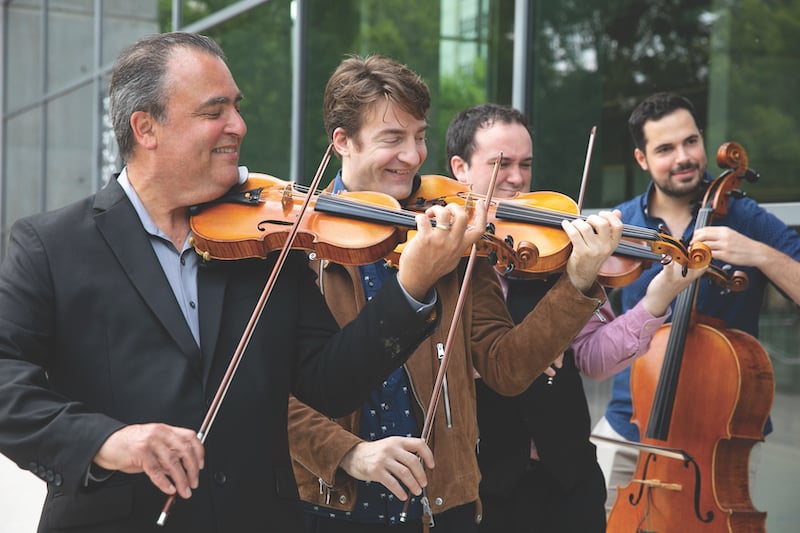[ad_1]
An enduring presence for almost four decades, the Turtle Island Quartet took listeners on a captivating musical journey across the globe on Friday in a highly accessible, classical/jazz fusion concert at the Schwartz Center for Performing Arts.
::
It’s always refreshing when a classical quartet excels in easily digestible modernism. Such was the case on Friday, March 22, when the multiple Grammy award-winning Turtle Island Quartet took the stage at Emory’s Schwartz Center for Performing Arts for a night of their signature string quartet surrealism.
The quartet — violinists Gabe Terracciano and David Balakrishnan, violist Benjamin Von Gutzeit, and cellist Naseem Alatrash — were on hand to present “Island Prayers,” a new work which, like much of the material on the bill, was co-commissioned by the Schwartz Center alongside the Lincoln Center for the Performing Arts, the Meany Center for the Performing Arts, the Music Hall of Portsmouth and the Savannah Music Festival.
Founded in 1985 by violinist Balakrishnan, the Turtle Island Quartet’s mission is to strike a balance between classical instrumentation and jazz improvisation, with the resulting combination used to explore the world’s manifold musical subgenres.
As such, the group’s sound carries an overt mid-1970s fusion quality that evokes comparisons to the similarly oriented Penguin Cafe Orchestra and the progressive rock explorations of King Crimson. It is a politely daring sound that sallies forth into exotic realms but never ventures beyond the bounds of listenability.

The quartet commenced with “Little Mouse Jumps,” a jaunty, up tempo Balakrishnan original thematically rooted in a Native American folk story about a little mouse and his hero’s journey towards self actualization. From a sonic standpoint the piece is cheerful and lighthearted, with the kind of comical jazz inflections that Claude Bolling brought into the classical realm, followed by a midsection of the sort of frontier-folk-as-classical-
The majority of the evening’s works were Balakrishnan originals but other composers were featured throughout. Rhiannon Giddens’ take on the traditional fiddle music staple “Pompey Ran Away” was upbeat and warm but underscored with a driving pop feel that called to mind the Celtic crossover stylings of Enya or Clannad.
“Pompey Ran Away” is the musical journey of a self-emancipated slave whose highly prized fiddle skills carry him across America. Such themes of oppressed persons finding transcendence through art were the evening’s conceptual throughline and nowhere was that more pronounced than in the concert’s feature piece, “Island Prayers.”
Like so many recent works of art across all mediums, “Island Prayers” began as a meditation on the human condition in light of the Covid pandemic, the heightened racial tensions in the United States, and other contemporary issues that have brought our collective temper to a boil. Thus the piece begins as a conversation between aggrieved parties with three movements (“Dialogue,” “Atonement” and “Redemption”) meant to bring about a gradual spirit of reconciliation.
As a conceptual framework, the structure makes for a nice progression of melodic developments with the group engaging in some fascinating improvisations and rich modal texturing. The individual players are highly adept at producing concurrent solos that weave in and out of one another to create a larger network of captivating musicality.
From a virtuosic standpoint, the piece finds Turtle Island at their unrestrained best but it falls short of realizing its thematic goals. It’s clear from the harsh stabs and shrill arpeggiation that Balakrishnan is aiming for the kind of hauntingly aggressive, ominous tone typified by the Kronos Quartet and the Philip Glass Ensemble. But the Turtle Island Quartet just doesn’t have the brooding ferocity necessary to go that dark. The ensemble’s signature amiability pervades throughout and the conflict being discussed feels more like a gentlemanly disagreement than a referendum on the ills of humanity.
Cellist Alatrash emerged as the evening’s most engaging soloist. His strongly pentatonic, Middle Eastern influenced solo on “Island Prayers” was easily the piece’s most captivating moment and he explored similar harmonic vistas on “Darkness Dreaming,” a work derived from an Indian raga scale meant to explore the cultural origins of gypsy jazz. It was clear throughout the night that Alatrash is a soloist who knows how to make his instrument transcend its traditional role and branch out in a consistently engaging manner to straddle multiple genres at once.
By the end of the evening the ensemble had taken listeners across the globe and carried on good- natured musical conversations throughout. Many similar groups have ventured out into world beat genre hopping only to sound like out of place tourists focusing on the musical cliches of various cultures.
The Turtle Island Quartet, by contrast, knows how to weave seemingly disparate strains of humanity together into a unified whole. It’s that unifying appeal that has made them such an enduring presence for almost four decades.
::
Jordan Owen began writing about music professionally at the age of 16 in Oxford, Mississippi. A 2006 graduate of the Berklee College of Music, he is a professional guitarist, bandleader and composer. He is currently the lead guitarist for the jazz group Other Strangers, the power metal band Axis of Empires and the melodic death/thrash metal band Century Spawn.
[ad_2]
Source link

